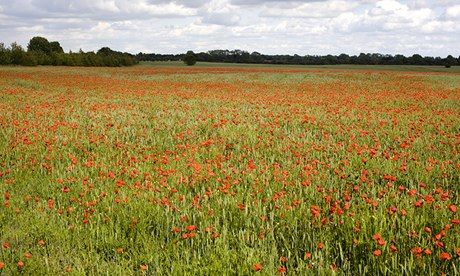Soldiers reaching camp after a nighttime mission are surprised by birdsong in this classic poem by the first world war great

Nature returns... A poppy field. Photograph: Martin Argles for the Guardian
This week's poem, Returning, We Hear Larks, is one of Isaac Rosenberg's most popular war poems, but I often wonder if he'd have made further revisions, given time. It's among the last handful of poems he wrote, working on scraps of paper in circumstances that would have silenced a less motivated artist. Yet the piece is typically his own, while laying bare the diverse influences integral to his style.
Rosenberg's life and work are a fusion of conflicting energies. To begin with the obvious ones: he was a painter and playwright as well as a poet. His first language was Yiddish; his first literary inspiration the Old Testament. Some of his best prewar poems are in the style of Blake – and not shallow imitations, either. Symbolist, realist, modernist, Romantic: Rosenberg could be selectively anthologised to embody any of these movements.
Most critics have favoured those of his war poems that use a vernacular idiom and free-verse structure to expose the misery and grotesqueness of everyday soldiering. You might argue that, like Owen, Rosenberg was released by war from self-conscious literariness. But you'd only be partly right. His finest war poem, Dead Man's Dump, is highly literary, a fused montage of the biblical, the Blakean and the Whitmanesque. Returning, We Hear Larks comes from a similar mould.
More
Rosenberg's life and work are a fusion of conflicting energies. To begin with the obvious ones: he was a painter and playwright as well as a poet. His first language was Yiddish; his first literary inspiration the Old Testament. Some of his best prewar poems are in the style of Blake – and not shallow imitations, either. Symbolist, realist, modernist, Romantic: Rosenberg could be selectively anthologised to embody any of these movements.
Most critics have favoured those of his war poems that use a vernacular idiom and free-verse structure to expose the misery and grotesqueness of everyday soldiering. You might argue that, like Owen, Rosenberg was released by war from self-conscious literariness. But you'd only be partly right. His finest war poem, Dead Man's Dump, is highly literary, a fused montage of the biblical, the Blakean and the Whitmanesque. Returning, We Hear Larks comes from a similar mould.
More
No comments:
Post a Comment